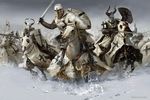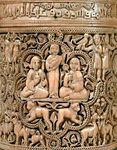History "History, despite its wrenching pain, cannot be unlived, but if faced with courage, need not be lived again." - Salisbury ...
←
→
Page content transcription
If your browser does not render page correctly, please read the page content below
History
Course Offerings / Spring 2022
“History, despite its wrenching pain,
cannot be unlived, but if faced with
courage, need not be lived again.”
– Maya AngelouNote: Check GullNet for Course Modality, Times and Location
HIST 101 and 102 World Civilizations HIST 103 First Year Seminar: Nature, Science and Technology in the
(Multiple Sections) Making of the Modern World | Dr. Bowler
Examination of global progress in major Study world history by investigating the role nature, science and technology have
civilizations from prehistoric times to the present played in shaping human civilizations, and vice versa. The introductory format
emphasizing the economic, social, cultural, provides opportunities to enhance academic aptitudes necessary for college success.
intellectual and political trends motivating human (4 Hours Credit) Meets General Education IIA or IIB
beings.
(4 Hours Credit) Meets General Education IIA or IIB HIST 103 First Year Seminar: Early Modern Colliding Cultures | Dr. McCarty
This introductory seminar explores the Early
HIST 103 First Year Seminar: World Religions | Dr. Bienstock Modern period when the world came together as
Explore the basic beliefs and practices of the major religious traditions of the never before: gunpowder empires expanded in Asia,
Western and the Eastern world – four eastern traditions – Hinduism, Buddhism, Japan challenged China’s regional power, Europeans
Confucianism and Taoism – and the three Abrahamic traditions – Judaism, conquered the civilizations of the Americas, and
Christianity and Islam. Additionally, analyze some lesser known world religions and African empires first connected both ends of the
some other religious trends. Sahara. But the collisions and conflicts of this
(4 Hours Credit) Meets General Education IIA or IIB age were also cultural, as the Renaissance and
Reformation questioned assumptions in the Christian
HIST 103 First Year Seminar: world, Islam adapted to pre-existing cultures in India
The World in the 20th Century and Eastern Europe, and Jesuits and Chinese scholars
Dr. Kotlowski debated ethics and salvation. In addition to reading
Survey world history during and writing about history, think about what made our
the 20th century, focusing on world the way it is today.
political, economic, social, cultural (4 Hours Credit) Meets General Education IIA or IIB
and military trends as well as
representative events and people HIST 201 and 202 History of the
that are particularly important to United States (Multiple Sections)
today’s world. Topics include the two world wars; Nazism and the Holocaust; the Survey of the political, economic, social and
Cold War; decolonization; revolutionary change in Russia, China and Iran; and the cultural factors that have shaped the pattern of
emergence of the Global South, especially the Middle East, India and China. life in the United States. Particular problems
(4 Hours Credit) Meets General Education IIA or IIB examined in the light of their sources and
historical development. HIST 201 goes through
HIST 103 First Year Seminar: Race, Identity and Power in the 1865 and HIST 202 from 1865 to the present.
Modern World | Dr. Venosa (4 Hours Credit) Meets General Education IIB
As the ongoing events across our country reveal, many of the major trends
throughout the 20th and early 21st century – including social movements, wars and HIST 215 Topics in History: Africana Women in the 20th Century
even shifts in popular-culture – have been impacted to a large extent by ideas of Dr. Venosa
“race,” racially based power systems and by governments classifying different groups Examine modern African history – as well as the broader
of people by a particular “identity.” From the rise of colonialism to the Holocaust connections across the African diaspora in the Americas
to the ongoing civil rights movement occurring right now across the United States, – with an emphasis on the contributions and agency of
learn about the key events in our modern world and more importantly, be challenged Africana women. In doing so, examine various cultures and
to reconsider everything you know – or think peoples of Africa while investigating some of the most critical
you know – about race, personal identity and the historical developments on the continent from the early 20th
making of the modern world. century to the present day. With female agency as the core
(4 Hours Credit) Meets General Education IIA or IIB theme of the course, examine several historical events and
—1—periods in modern African history, which will in turn explore such themes as state HIST 320 From Romans to Vikings
centralization, the scramble for Africa, colonialism, nationalism, national liberation Dr. Vicens
struggles, gender roles, public health and globalization. Survey of culture and institutions of Europe and the
(4 Hours Credit) Meets General Education IIB Mediterranean world from the rise of Christianity to the
Non-U.S./non-European course 11th century. Emphasizes the formation of the Christian Church,
the demise of the Western Roman Empire, the transformation
HIST 215 Topics in History: from Roman provinces to barbarian kingdoms, the making of
Hellenistic Mediterranean | Mr. Birch Carolingian Europe and the legacy of the Viking Age.”
The Hellenistic Mediterranean was a world of great cultural (4 Hours Credit) Meets General Education IIB
diversity and social transformations. Explore the world of the
Hellenistic Mediterranean from approximately 323 through HIST 327 The Habsburg Empire, 1740-1918 | Dr. Ference
30 BCE with an emphasis on the changing social and cultural Examination of the Habsburg lands and peoples emphasizing the political, cultural,
climate. Hopefully, a greater awareness of past societies economic, dynastic and ethnic problems of the monarchy.
enhances your understanding of, and appreciation for, modern (4 Hours Credit) Meets General Education IIB
cultures. In addition to gaining important knowledge of past
societies, develop research, critical thinking and critical writing HIST 330 Proseminar in History
skills through readings, class discussions, essays and writing (Multiple Sections)
assignments. Developing these skills is a major component of the course. Guides students in the production of
(4 Hours Credit) Meets General Education IIB a thesis-driven formal research paper.
Conduct primary research; identify and
HIST 224 Hitler and the Third Reich obtain relevant, trustworthy sources; and
Dr. Bowler analyze those materials. Learn and apply
An examination of the history of Nazi Germany conventions of the historical discipline.
and its significance. Chief topics include the roots (4 Hours Credit) Meets General Education IIB
of Nazism, World War I, Weimar Republic, Hitler,
Nazi capture of power, the racial state, World HIST 341 History of Africa: 1870-Present | Dr. Venosa
War II in Europe, the Shoah (Holocaust), and the Emphasizes the history and politics of imperialism from the “scramble” for Africa to
destruction and legacy of the Third Reich. decolonization. Emphasis on the interaction of African and European institutions.
Bundesarchiv, Bild 183-1987-0703-507 / unbekannt / CC-BY-SA 3.0.) (4 Hours Credit) Meets General Education IIB (4 Hours Credit) Meets General Education IIB
Non-U.S./non-European course.
HIST 225 Holocaust and the Extermination of the European Jews
Dr. Pereboom HIST 363 Japanese Civilization | Dr. McCarty
Examination of European anti-Semitism from its origins to its culmination in the Though Japan first emerged in the Chinese cultural sphere, it charted a course
Holocaust; major emphasis on the treatment of Jews by Nazi Germany and on the of its own in East Asia – from the aristocratic accomplishments of the Heian
reaction of Jews and the outside world to this treatment. court, the enduring dominance of Buddhism, to diverse and strikingly innovative
(4 Hours Credit) Meets General Education IIB iterations of warrior rule by the samurai. Through
lectures, readings, discussions and a research
HIST 314 African American History to 1865 | Dr. Gonzalez project, become familiar with some major themes
Explores African American history from the Colonial period to1865. Highlights the of Japan, including its rich philosophical and
development and perpetuation of slavery, the vibrancy of free black communities, religious traditions, by exploring the full range of
the rise of antislavery leaders and movements, and social conditions experienced by Japanese history from the pre-historic period until
African Americans. approximately the year 1800.
May not receive credit for both HIST 444 and HIST 314. (4 Hours Credit) Meets General Education IIB
(4 Hours Credit) Meets General Education IIB Non-U.S./non-European course.
—2—HIST 378 Women in Modern America | Dr. French history, from 1300-1500 AD – first and foremost, the extraordinary success of the
Charts the course of the women’s movement in 20th-century America, examining House of Osman. How did a small band of warriors build one of the greatest and
the relationship between organized feminism and changes in public and private lives longest-lasting empires in world history? Discuss these and other questions about
of women from different class, racial and ethnic backgrounds. the Ottoman Empire, including the revival of Eurasian pathways, sexual politics of
(4 Hours Credit) Meets General Education IIB succession, slaves of the sultan, consolidation of a service elite and protection of a
multiconfessional polity. Side by side with a more focused study of Ottoman history,
HIST 389 U.S. Environmental History | Dr. Long explore major historical issues that helped shape Middle Eastern, European and
History of rural and urban land use. Topics include the rise of the public lands Asian history.
movement and environmentalism in the United States, the history of ecology and the (4 Hours Credit) Meets General Education IIB
cultural roots of the modern environmental crisis. Non-U.S./non-European course
(4 Hours Credit) Meets General Education IIB
Fall 2022 Research Seminar Capstone Topics
HIST 413/519 Social and Cultural History of the (Tentative and Subject to Change):
United States II | Dr. Goyens • U.S.-Mexico Border
Studies of American thought as reflected by the people • The Making of Medieval Europe: Renaissance, Reformation and
and leaders. Development of American heritage from Crisis in the Long 12th Century
the colonial period to the present, emphasizing the
intellectual, social, religious and economic movements. HIST 479/579 Medieval Military History
The first course covers from the colonial period to Dr. Talbert
reconstruction and the second course from about 1876 Explores the military history of the
to present. medieval world from the fall of the Roman
(4 Hours Undergraduate Credit/ 3 Hours Graduate Credit) Empire in the fourth century A.D. and the
Meets General Education IIB establishment of the Germanic kingdoms to
the decline of the supremacy of mounted
HIST 430 Research Seminar Capstone: Revolt and Dissent in the warrior at the beginning of the sixth century.
19th-Century United States | Dr. Gonzalez Understand the relationships between
Guns. Petitions. Conventions. Suits. Lawsuits. Explore many forms of dissent that military realities and the social structure of medieval societies. Understand the
clashed with commonly held beliefs and practices during the 19th century. Using strategy and tactics used by medieval armies, how these tactics affected the lives
a range of primary and secondary sources, examine the strategies that Native of populations and how new developments in these fields led to the creation of
Americans, women, African Americans, nation-states in the early modern period. Study the ideas of the period through the
transpeople, religious minorities and lives of some of the medieval world’s greatest soldiers, statesmen, philosophers and
unpropertied men (to name a few) used to historians.
challenge their circumstances. Create an original (4 Hours Undergraduate Credit/ 3 Hours Graduate Credit) Meets General Education IIB
research paper or project using primary and
secondary sources focused on a specific topic HIST 490/590 (GSST 485): Gender and Sexuality Studies Capstone Seminar
within 19th century United States history. Dr. French
(4 Hours Credit) Meets General Education IIB Examine gender and sexuality and questions from a multidisciplinary perspective
including history. Read foundational feminist writings as well as newer scholarship in
HIST 430 Research Seminar Capstone: Rise of the Ottomans | Dr. Emin Lelic the field in multiple disciplines. History students have the opportunity to pursue an
Around the year 1300, a warrior by the name of Osman set out with his followers independent student-directed research project on a topic relevant to gender studies.
to carve out a fiefdom and a name for himself. He succeeded beyond his wildest A further goal is to explore careers and graduate programs relevant to gender and
dreams. Indeed, by the 1500s, the descendants of Osman had built the greatest, sexuality studies.
most magnificent and powerful empire west of China. Their rule extended across (4 Hours Undergraduate Credit/ 3 Hours Graduate Credit) Meets General Education IIB
Europe, Asia and Africa. Discuss the driving historiographical questions of Ottoman
—3—HIST 604 Seminar in European History: Seminar in Habsburg History
Dr. Ference
The Habsburgs were Europe’s
Anthropology
greatest dynasty. Between the 13th The Anthropology Program offers a Bachelor of Arts in interdisciplinary
and 20th centuries, they provided studies with an anthropology track and an anthropology minor.
rulers for empires, kingdoms, duchies
and principalities in modern-day ANTH 100 Cultural Anthropology and Linguistics | Dr. Vassallo-Oby
Germany, Austria, Spain and its Introduction to the study of human culture and communication across a wide range
colonies, Portugal and its colonies, of traditional and modern societies, with an emphasis on participant-observation
Italy, Belgium, the Netherlands, ethnographic fieldwork.
Romania, Hungary, Ukraine, the (4 Hours Credit) Meets General Education IIB or IIIC
Czech Republic, Slovakia, Slovenia,
Croatia, Bosnia, and Servia. The total areas in the 19th century were still vast, ANTH 102 Biological Anthropology and Archaeology | Dr. Ragan
making the empire the largest country in Europe after Russia. Emphasis is placed Introduction to the study of human biological and cultural evolution from the
on topical investigations of the various political, social and cultural trends as they earliest hominins to the present, with an emphasis on paleoanthropological and
influence this empire. By a thorough reading of the materials of the topics, become archaeological research.
aware of the chief characteristics of the various trends and peoples of East Central (4 Hours Credit) Meets General Education IIB or IIIC
Europe from the age of the Habsburg through today. Habsburg history forms an
intricate part of European history and to understand the Habsburg Monarchy is to ANTH 200 Topics in Anthropology:
understand Europe. Race and Racism | Dr. Ragan
(3 Hours Graduate Credit)
As humans, we create the ideas we use to
understand the world around us, the social
HIST 612 Special Topics Seminar in the History of U.S. Women’s Activism world as much as the planet we live on. One
Dr. French of the defining ideas of the Modern world
This seminar examines the methods and historiography of the history of women is that people belong to different races – and
and gender in the U.S. with a special focus on women’s activism from the antebellum as different “kinds” of people, it then treats
era to the recent past. The readings address key moments of women’s activism, such them differently. Topics examined include the
as antislavery, suffrage, LGBTQ rights and contemporary feminism. A special focus biological differences between people globally,
is the 1977 National Women’s Conference, a historic event that brought thousands the way these have been used to define and naturalize the categories we call “races”;
of people from all races, ethnicities, sexualities and political ideologies together in and how those categories have been used to create and maintain sociopolitical
Houston, TX, where they debated resolutions aimed at improving the status of hierarchies in the past and present. If our ancestors constructed these categories, can
women in the U.S. The U.S. Congress appropriated $5 million to organize the four- we deconstruct them, or have they taken on a life of their own?
day conference, the only of its kind in U.S. history. Contribute to a digital humanities (4 Hours Credit) Meets General Education IIB or IIIC
biography project, Sharing Stories from 1977, by researching the lives of activists present
at the National Women’s Conference. ANTH 302 Archaeological Method and Theory | Dr. Ragan
(3 Hours Graduate Credit)
Survey of the theoretical history of archaeology and a detailed overview of the
methods of archaeological research.
(4 Hours Credit) Meets General Education IIB or IIIC
—4—SU is an Equal Opportunity/AA/Title IX university and provides reasonable accommodation given sufficient notice to the University office or staff sponsoring the event or program. For more information regarding SU’s policies and procedures, please visit www.salisbury.edu/equity.
You can also read



























































